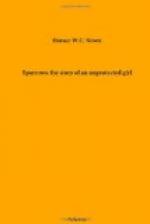“Good night,” he said, as he stopped just before they reached the nearest lodge gates of her grounds.
“Good night and thank you,” replied Mavis.
“I won’t wish you a very happy Christmas.”
“May I wish you one?”
“Good night,” he answered curtly.
CHAPTER FORTY-ONE
TRIBULATION
Although, as time went on, Mavis became used to her griefs, and although she got pleasure from the opulent, cultured atmosphere with which she was surrounded, she was neither physically nor spiritually happy. It was not that the mutual love existing between herself and Harold abated one jot; neither was it that she had lost overmuch of her old joyousness in nature and life. But there were two voids in her being (one of which she knew could never be filled) which were the cause of her distress. A woman of strong domestic instincts, she would have loved nothing better than to have had one or two children. Owing to her changed circumstances, maternity would not be associated with the acute discomforts which she had once experienced. Whenever she heard of a woman of her acquaintance having a baby, her face would change, her heart would be charged with a consuming envy. Illustrations of children’s garments in the advertisement columns of women’s journals caused her to turn the page quickly. Whenever little ones visited her, she would often, particularly if the guest were a boy, furtively hug him to her heart. Once or twice, on these occasions, she caught Windebank’s eye, when she wondered if he understood her longing.
Her other hunger was for things of the spirit. She was as one adrift upon a sea of doubt; many havens noticed her signals of distress, but, despite the arrant display of their attractions, she could not find one that promised anchorage to which she could completely trust. Her old-time implicit faith in the existence of a Heavenly Father, who cared for the sparrows of life, had waned. Whenever the simple belief recurred to her, as it sometimes did, she would think of Mrs Gowler’s, to shudder and put the thought of beneficent interference with the things of the world from her mind.
At the same time she could not forget that when there had seemed every prospect of her being lost in the mire of London, or in the slough of anguish following upon her boy’s death, she had, as if by a miracle, escaped.
Now and again, she would find herself wondering if, after all, the barque of her life had been steered by a guiding Hand, which, although it had taken her over storm-tossed seas and stranded her on lone beaches, had brought her safely, if troubled by the wrack of the waters she had passed, into harbour.
Incapable of clear thought, she could arrive at no conclusion that satisfied her.
At last, she went to Windebank to see if he could help.
“What is one to do if one isn’t altogether happy?” she asked.




